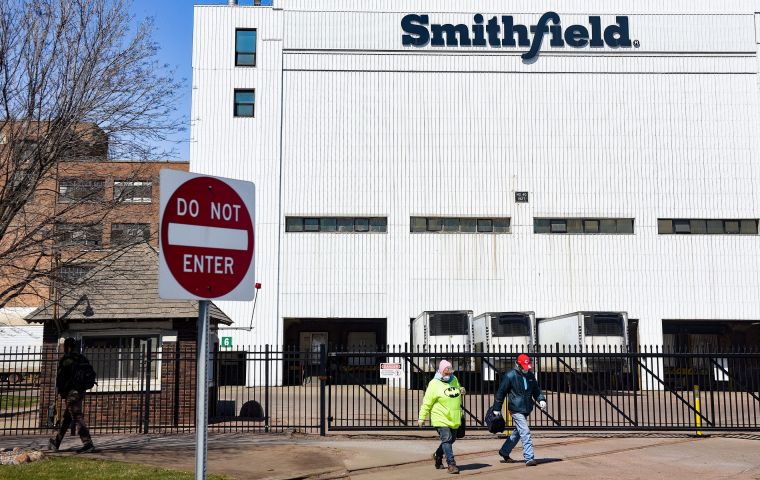MercoPress. South Atlantic News Agency
US pork supply “on the edge”: Smithfield Foods shutters South Dakota major plant indefinitely
 The move comes after state officials reported more than 200 cases of Covid-19 among plant employees, adding to a spike in infections among US meat workers
The move comes after state officials reported more than 200 cases of Covid-19 among plant employees, adding to a spike in infections among US meat workers The world's biggest pork producer is shuttering a major United States plant indefinitely after a coronavirus outbreak among employees, with the company warning that closures across the country are taking American meat supplies “perilously close to the edge” of shortfalls.
Smithfield Foods will idle its Sioux Falls, South Dakota, pork-processing facility, which accounts for 4/5% of US production, the company said in a statement on Sunday. The move comes after state officials reported more than 200 cases of Covid-19 among plant employees, adding to a spike in infections that's seen hundreds of American meat workers get sick. Plants have been forced to shutter or reduce output.
“The closure of this facility, combined with a growing list of other protein plants that have shuttered across our industry, is pushing our country perilously close to the edge in terms of our meat supply,” Smithfield chief executive officer Ken Sullivan said in the statement. “It is impossible to keep our grocery stores stocked if our plants are not running.”
While it's unclear whether the meat-employee infections have anything to do with the workplaces, the news exposes the vulnerability of global supply chains that are needed to keep grocers stocked after panic buying left shelves empty. The shuttered plants and sick workers are adding to other disruptions caused by the virus that's making it harder for food to get from farm to table. Trucking bottlenecks, and snarled port traffic have also contributed to why shoppers are seeing empty shelves.
The surge in cases has also raised concerns over worker safety. Deaths have been reported for employees at meat facilities owned by JBS SA and Tyson Foods. Laborers have, in some cases, staged walk-outs to protest against working conditions. In meat plants, stations on processing lines can be close together, creating challenges for social distancing. Workers also share break and locker rooms.
Smithfield, owned by Hong Kong-listed WH Group, originally planned to shutter the South Dakota facility for three days. South Dakota Governor Kristi Noem asked for the closure to be extended to at least 14 days, saying in a letter to the company that it needed to “do more”.
The Smithfield facility's 3,700 employees will receive pay for at least two weeks during the shutdown. The company said it will reopen the plant when it receives further direction from local, state and federal authorities.
“Unfortunately, Covid-19 cases are now ubiquitous across our country. The virus is afflicting communities everywhere. The agriculture and food sectors have not been immune,” Mr Sullivan said. “We have continued to run our facilities for one reason: to sustain our nation's food supply during this pandemic.”
Workers in other points of the food-supply chain have also started to get sick. In all likelihood, the number of cases will keep going up at meat plants, farms, warehouses and packaging factories across the globe. That's pointing to an acute contradiction between the need to keep people safe, while also ensuring that the world has enough food.
To be clear, the output from a plant where infection pops up doesn't pose health concerns because by all accounts Covid-19 isn't a food-borne illness. Supplies from a farm or a production plant with a confirmed case can still be sent out for distribution.
Still, there is a risk to continued production. When a worker gets sick, the employee and every person they've come into contact with has to be quarantined. Plants also needs to close for deep cleanings. A Cargill Inc plant in Pennsylvania has also been closed temporarily because of an outbreak among employees.
Some companies also had to slow down plants that are set up to supply restaurants, instead of supermarkets. Sanderson Farms, the US's third-largest chicken processor, said earlier this month that it would run plants that process big birds for the food-services industry “well below capacity”, according to CEO Joe Sanderson.




Top Comments
Disclaimer & comment rulesCommenting for this story is now closed.
If you have a Facebook account, become a fan and comment on our Facebook Page!